In the world of household pets, cats hold a special place. Their habits and needs make us contemplate what foods are safe for them and which might lead to unfavorable consequences.
Mushrooms are a topic that piques the interest and concerns many cat owners. To answer all your concerns, cats should not eat mushrooms. However, let’s explore which types are safe and which could pose risks to our furry companions.
Mushrooms and Cats: Do Cats Like Mushrooms?
The intriguing inquiry often arises: “Do cats like mushrooms?” The response is not as black and white as it initially appears. By and large, cats tend not to exhibit any particular fondness for mushrooms, primarily because these fungal organisms do not align with their innate dietary preferences.
Nonetheless, certain felines may inadvertently partake in mushrooms if they chance upon them during their explorations.
In the intricate tapestry of a cat’s culinary inclinations, the stance on mushrooms adds a layer of curiosity. While these enigmatic fungi remain largely outside feline gastronomy, accidental interaction might offer a glimpse into the intriguing intersection of curiosity and luck within the feline world.
As we delve deeper, let’s unravel the interplay between mushrooms and cats, shedding light on a facet of their behavior that often goes unnoticed.
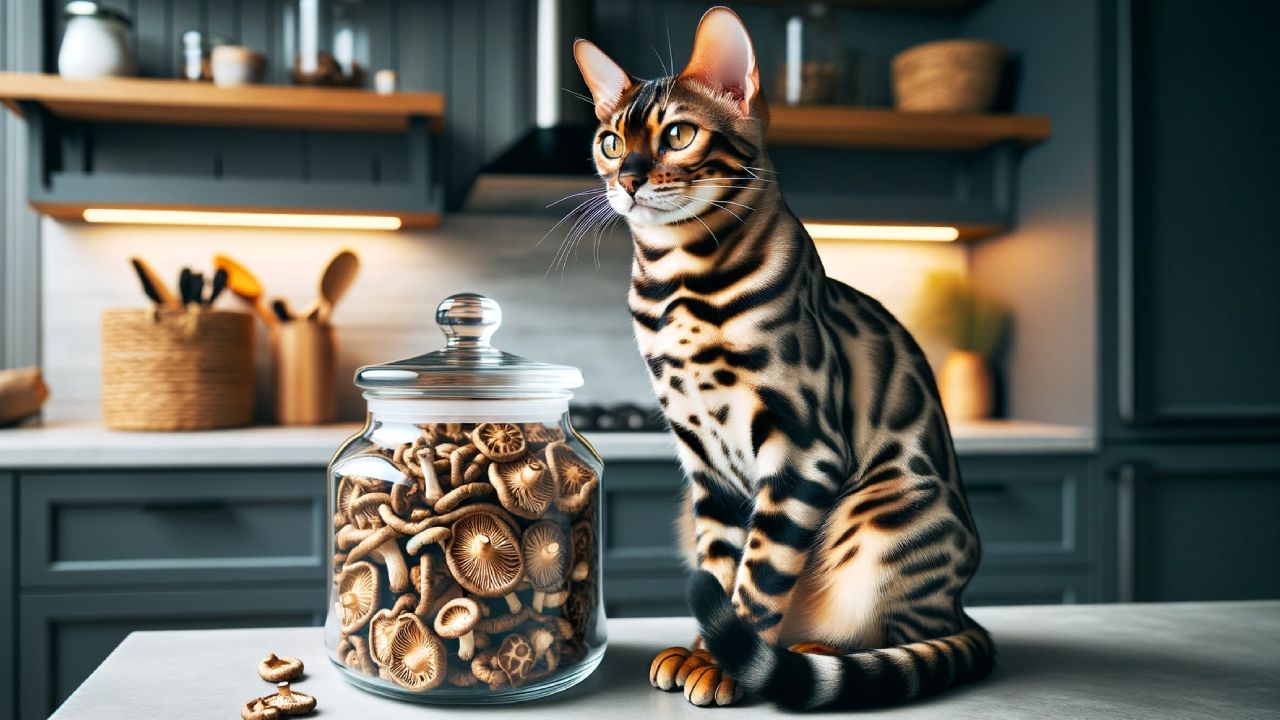
Potential Health Benefits of Mushrooms for Cats
When considering the potential health benefits of mushrooms for cats, it is essential to consider the nuances of the topic.
While it is essential to realize that some types of mushrooms can be poisonous and dangerous to cats, it is equally important to note that some mushrooms are potentially beneficial due to their nutritional and health properties.
Take the common button mushrooms, for example. These inconspicuous mushrooms contain an array of B vitamins and additional antioxidants that can positively impact a cat’s overall health. These components can help strengthen a cat’s immune system and support its physiological functions.
However, whether introducing mushrooms into a cat’s diet is a wise choice remains an open question. Responsible cat owners must consider the balance between the potential benefits and risks associated with mushroom consumption.
Although some mushrooms may contribute nutritionally to the diet, caution should be exercised, the opinions of professional veterinarians should be sought, and care should be taken to ensure that any dietary changes are made with the utmost care and concern for the cat’s health.
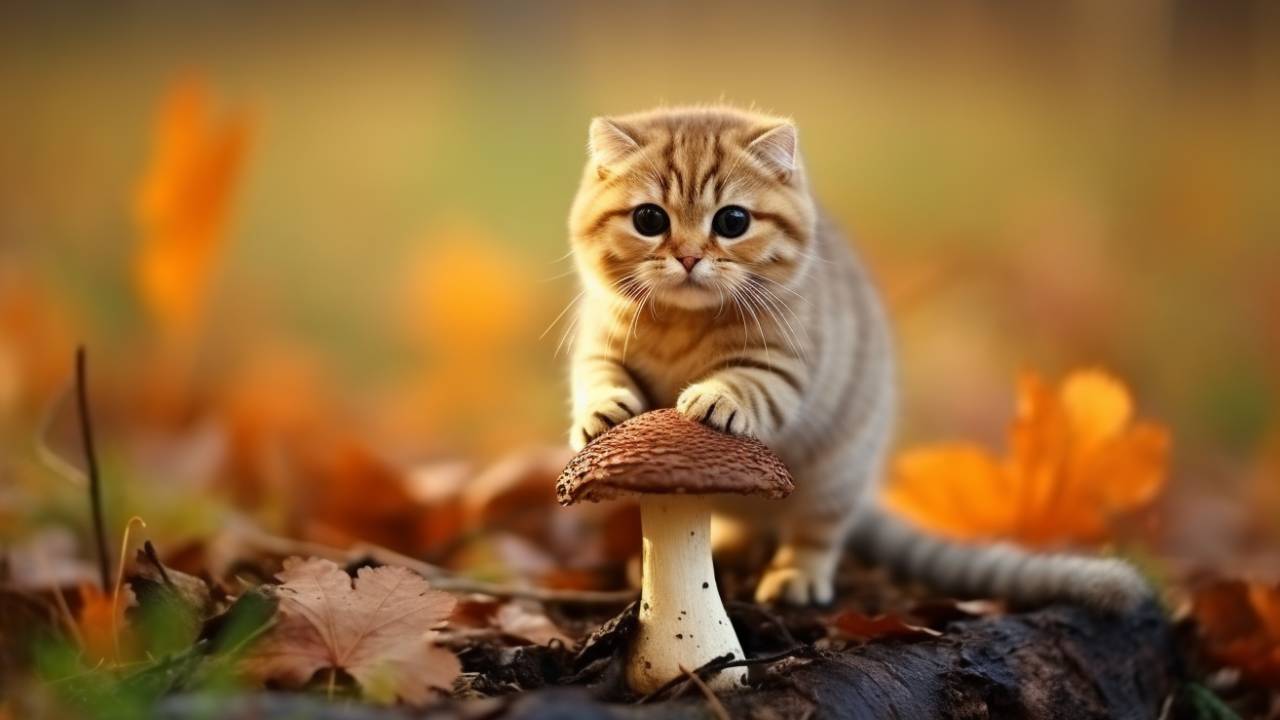
Safe Mushroom Varieties for Cats
Regarding whether cats can consume mushrooms, it’s essential to exercise caution due to the potential risks associated with many mushroom varieties. However, specific types of mushrooms are relatively safer for cats when prepared and served appropriately. Here are a few mushroom varieties that can be considered with care:
- White Mushrooms (Agaricus bisporus)
These mushrooms are easily recognizable by their pale color and characteristic fleshy caps. They are known for their relatively mild flavor and are often used in various culinary dishes. White mushrooms contain a decent amount of protein, which could benefit cats in moderation when included in their diet.
- Shiitake Mushrooms (Lentinula edodes)
They are renowned for their unique smoky flavor and are a staple in many Asian cuisines. These mushrooms offer potential health benefits due to their various bioactive compounds. If you introduce shiitake mushrooms to your cat’s diet, it’s essential to ensure they are cooked thoroughly to enhance digestibility.
- Portobello Mushrooms (Agaricus bisporus)
They are matured white mushrooms characterized by their large size and rich, earthy taste. They can offer a meaty texture that some cats might find interesting when appropriately cooked.
However, remember that moderation is critical and should only be provided to your cat after being cooked to remove potentially harmful compounds.
While these mushroom varieties are considered to have a lower risk profile compared to more toxic species, it’s crucial to emphasize that introducing new foods into a cat’s diet should be done gradually and under the guidance of a veterinarian.
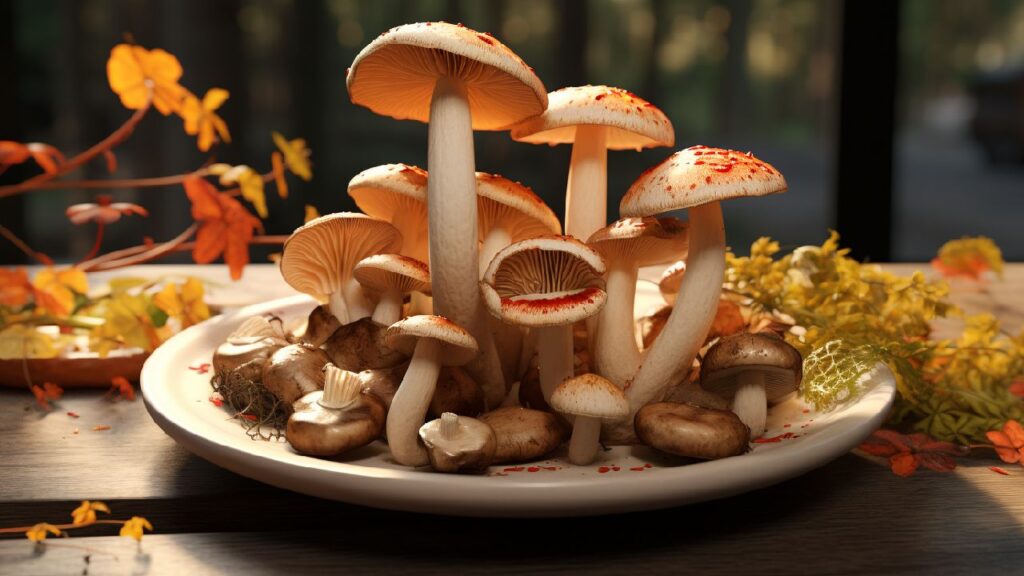
Even with safer options, thorough cooking is essential to break down complex compounds and improve digestibility.
Which Mushrooms Are Poisonous To Cats?
While the world of mushrooms can be intriguing, it also presents a significant hazard to our beloved feline friends. Several mushroom species contain toxic substances capable of causing severe poisoning in cats. Among the most dangerous varieties are:
- Amanita Species (Including Death Cap Mushroom)
These mushrooms, notably the Death Cap (Amanita phalloides), are responsible for a substantial number of mushroom poisonings in both humans and pets. They contain potent toxins that can lead to liver and kidney failure. Even a small consumption of these mushrooms can have devastating consequences.
- Panther Mushroom (Amanita pantherina)
Another member of the Amanita genus, the panther mushroom, contains toxins that can lead to various poisoning symptoms, including gastrointestinal distress, neurological issues, and organ damage.
- False Morels (Gyromitra species)
Though visually distinct from true morels, false morels can be equally dangerous. They contain gyromitrin, which can cause severe poisoning and even be fatal if ingested.
- Galerina Mushroom
Galerina species contain the same deadly toxins as the Amanita mushrooms. These toxins can cause liver damage and other serious health issues in cats.
- Cortinarius Mushroom
Some species within the Cortinarius genus produce harmful toxins that can lead to gastrointestinal distress and kidney damage.
It’s crucial to recognize the potential dangers these mushrooms pose to cats. Even a small quantity can result in severe illnesses and, in some cases, death. If you suspect your cat has ingested any wild mushroom or is exhibiting symptoms of mushroom poisoning, it’s imperative to seek immediate veterinary assistance.
Preventive measures, such as limiting outdoor access and closely monitoring your cat’s environment, can help mitigate the risks associated with these toxic mushroom species.
Potential Hazards of Mushroom Consumption by Cats
The risks associated with cats consuming mushrooms extend beyond their inherent toxicity. The intricate nature of feline digestive systems may pose challenges in effectively processing mushrooms.
This could trigger various complications, including digestive disorders, allergic responses, and health issues.
As a result, prudence dictates refraining from incorporating even ostensibly safe mushroom varieties into a cat’s dietary regimen. Prioritizing the well-being of your feline companion necessitates a cautious approach to their nutrition.
Cats and the Myth of Sensing Magic Mushroom Effects
Within feline lore, intriguing myths have been woven around the notion that cats possess an innate ability to detect the effects of magic mushrooms, including the renowned psilocybin mushrooms. Despite the allure of such tales, it’s important to note that these notions lack substantial scientific grounding.
While separate and distinct biological systems govern both fascinating creatures, cats, and humans, as a result, what might induce perceptible effects in one species may not necessarily translate to the other.
Regrettably, no empirical evidence exists to substantiate the claim that cats can sense or respond to the influence of magic mushrooms.
While the relationship between cats and mushrooms remains complex, it’s crucial to approach such myths with a healthy dose of skepticism. Relying on well-established scientific knowledge and consulting experts ensures a more accurate understanding of how these substances might impact various species.
As we unravel the intricate web of feline behavior and biology, it becomes evident that some myths, though captivating, are far from substantiated reality.
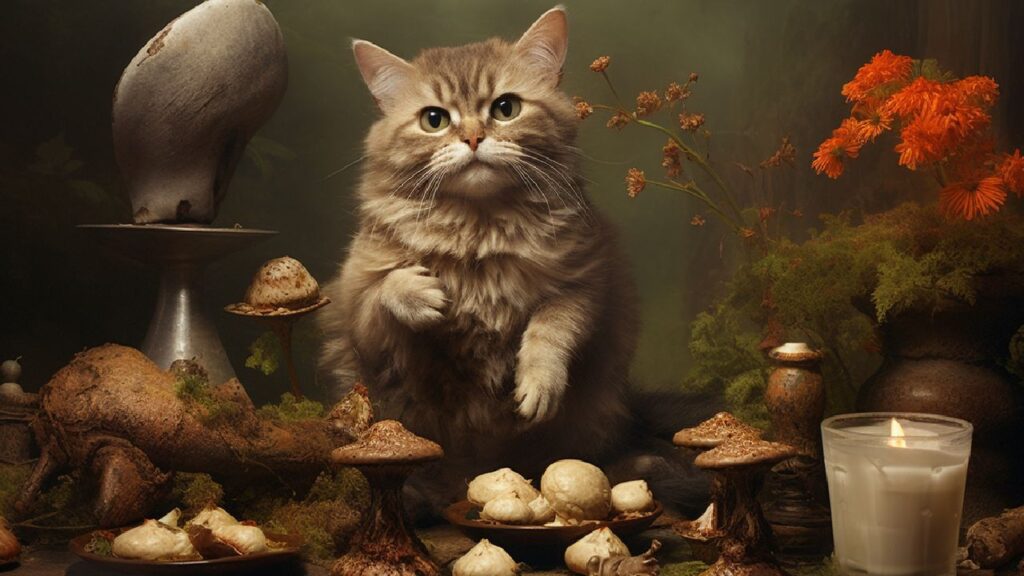
Raw Mushrooms and Cats: Proceed with Caution
The issue of whether raw mushrooms should be included in a cat’s diet requires careful consideration. Raw mushrooms pose potential challenges for digestion and may even contain toxic elements that could harm cats.
Therefore, it’s essential to exercise prudence and adhere to specific guidelines when feeding mushrooms to your feline friend.
- Cooking is Key
If you’re contemplating introducing mushrooms to your cat’s diet, ensuring they are fully cooked and prepared is imperative. Cooking not only enhances the digestibility of mushrooms but also helps eliminate any potential toxins that might be present. Properly cooked mushrooms are generally safer for cats to consume.
- Moderation is Advised
Even when mushrooms are cooked, you should offer them to your cat in moderation. While certain varieties may be considered safe when prepared correctly, overindulgence could still lead to digestive disturbances. Remember, a balanced and nutritionally appropriate diet tailored to your cat’s needs should always precede.
- Considering Alternatives
While some mushroom varieties have potential health benefits for cats, it’s crucial to carefully weigh the risks and benefits. Opting for other cat-friendly foods better suited to their nutritional requirements may be more prudent.
Conclusion
The question of whether cats can consume mushrooms is multifaceted. The safety and benefits of mushrooms for cat health depend on the mushroom variety, its preparation, and the individual characteristics of the animal.
It’s crucial to remember that, in case of uncertainty, consulting a veterinarian is the best way to ensure the safety and well-being of your furry companion.

FAQs
Can I feed my cat mushrooms regularly as part of their diet?
While some mushrooms may offer potential health benefits, it’s important to remember that cats have specific dietary requirements. Mushrooms should only be an occasional treat and should not replace a balanced cat food diet recommended by a veterinarian.
Are there any signs of mushroom poisoning in cats?
Symptoms of mushroom poisoning in cats can include vomiting, diarrhea, lethargy, abdominal pain, jaundice, and neurological issues. If you notice these symptoms after your cat has ingested mushrooms, seek immediate veterinary care.
Are store-bought mushrooms safe for cats to eat?
Store-bought mushrooms like white, shiitake, and portobello can be considered safer options for cats if adequately cooked and in moderation. However, always ensure they are thoroughly cooked and consult your vet before introducing them.
Can I grow cat-safe mushrooms for my pet?
While there are some commercially available cat-safe mushroom kits, consulting with a veterinarian before growing mushrooms specifically for your cat is recommended. Not all mushroom varieties are suitable, and safety precautions must be taken.
What should I do if my cat accidentally eats mushrooms?
If your cat has ingested mushrooms, try to identify the type of mushroom if possible. Contact your veterinarian immediately and provide as much information as you can. Quick action is crucial in case of mushroom poisoning.
Are there any cat-specific mushroom allergies?
While rare, cats can develop allergies to certain foods, including mushrooms. Watch for any signs of allergic reactions such as itching, skin problems, or gastrointestinal issues after consuming mushrooms.
Can I feed my cat wild mushrooms if I am unsure about their toxicity?
No, you should never feed your cat wild mushrooms. Many wild mushrooms are toxic, and accurately identifying safe varieties is difficult. To ensure your cat’s safety, stick to commercially available mushrooms that are safe for consumption.


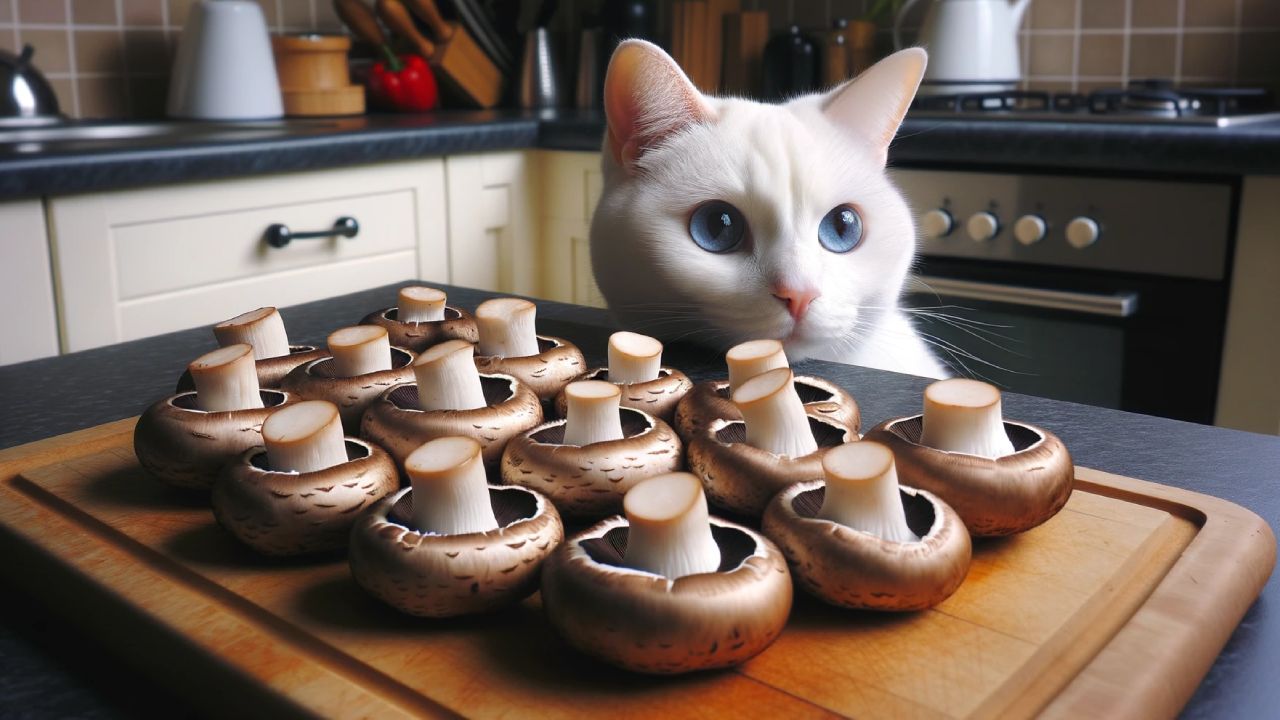



I’ve been feeding my cat mushrooms from time to time, thinking they’re safe. But after reading this article, I’m having second thoughts. I appreciate the detailed explanation about the risks. Better safe than sorry, right? 😺🍄
Loved the breakdown of safe mushroom varieties! Planning to introduce a tiny bit of cooked white mushrooms to my cat, Whiskey, who’s quite the gourmet. Anyone else have a cat with a taste for the finer (and safer) things?
my cat is so curious…